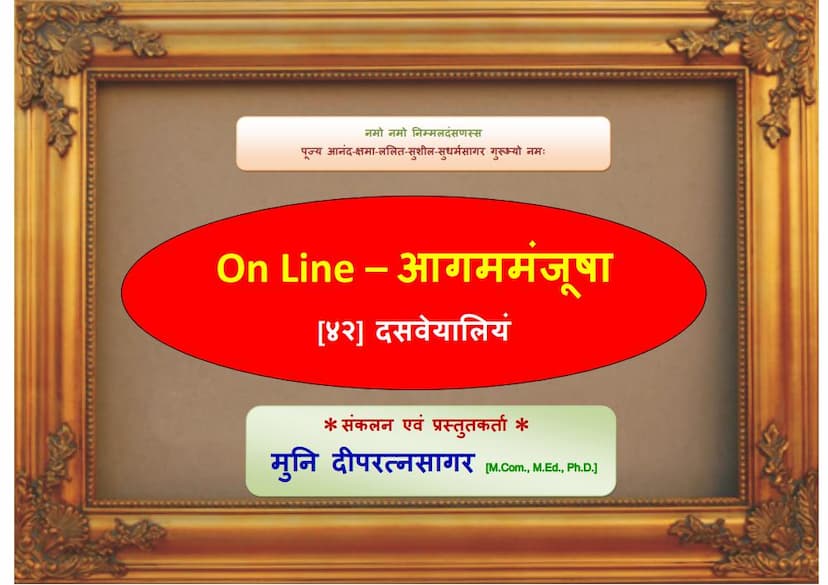Aagam Manjusha 42 Mulsuttam Mool 03 Dasveyaliyam
Added to library: September 1, 2025

Summary
This document is an "Online Aagam Manjusha" presenting the Jain text "Dasveyaliyam" (दशवैकालिक). The project aims to provide an online version of the Aagam Manjusha, which was originally compiled 70 years prior (in 1942 CE, Veer Samvat 2468) by Acharya Anand Sagarsuri. This updated version, released in 2012 CE (Veer Samvat 2538), includes some beneficial changes and incorporates other related Jain scriptures that were either included or had their printing locations changed in the original compilation.
The text itself, "Dasveyaliyam," appears to be a collection of sermons or teachings, covering various aspects of Jain practice and philosophy. Based on the provided pages, here's a breakdown of the key themes and content:
Core Principles and Practices:
- Reverence for Pure Vision (Nirmal Darshan): The text begins with salutations to pure vision, highlighting its importance.
- The Path of Jain Monks (Shravak): It describes monks (munis, samanas) as resembling bees that collect nectar from flowers without harming them, emphasizing their detachment and their sustenance through ethical means.
- Renunciation and Detachment: A significant portion focuses on the principles of renunciation from worldly desires, possessions, and pleasures. It details what constitutes true renunciation versus merely abandoning things.
- The Five Great Vows (Pancha Mahavratas): The text elaborates on the five major vows of Jainism:
- Ahimsa (Non-violence): Abstaining from harming any living being through mind, speech, or body. This is detailed with strong affirmations and confessions of any transgression.
- Satya (Truthfulness): Avoiding falsehood, even for reasons like anger, greed, fear, or humor.
- Asteya (Non-stealing): Not taking what is not freely given, regardless of value or quantity, sentient or non-sentient.
- Brahmacharya (Celibacy/Chastity): Abstaining from sexual conduct with humans, animals, or other beings.
- Aparigraha (Non-possession): Renouncing ownership and attachment to possessions, both internal and external.
- Austerities and Discipline: The text emphasizes the importance of austerities (tapas) and rigorous self-discipline for spiritual progress.
- Mindful Conduct: It stresses the need for constant mindfulness in all actions, speech, and thoughts, avoiding any harm to living beings.
- Ethical Behavior in Daily Life: The text provides specific guidelines for monks on how to conduct themselves, including:
- Movement and Observation (Irya): Walking carefully, observing the path, and avoiding stepping on or harming living beings (earth-bodied, water-bodied, fire-bodied, air-bodied, plant-bodied, and mobile beings). This includes detailed instructions on examining the ground and objects before stepping or sitting.
- Accepting Alms (Eshana): Strict rules about what kind of food and drink can be accepted and consumed, avoiding forbidden items and improper preparation.
- Behavior in Society: Guidelines on interacting with people, avoiding certain places, and maintaining detachment in the midst of social interactions.
- Personal Hygiene and Possessions: Restrictions on bathing, using perfumes, and possessing unnecessary items.
- Speech and Conduct: The importance of truthful, gentle, and beneficial speech, avoiding harsh words, gossip, and boasting.
- Dealing with Afflictions: Instructions on how to endure hardships, pains, and adversities with equanimity.
- The Six Categories of Living Beings (Sajeeva): The text identifies the six classes of living beings (earth, water, fire, air, plants, and mobile beings) and emphasizes the commitment to not harm them.
- Destruction of Karma: The ultimate goal is to shed accumulated karma through righteous conduct, austerities, and self-discipline, leading to liberation (moksha).
Specific Chapters/Sections (based on page content):
- Page 3-4: Mahavratas (Great Vows): This section details the five great vows and the associated renunciations and confessional prayers.
- Page 5-13: Conduct of Monks (Acharya Vidhi): This forms a substantial part of the text, outlining the practical aspects of a Jain monk's life. It covers:
- Daily Routines: Instructions on movement, alms-seeking, eating, and speech.
- Dietary Restrictions: Detailed lists of forbidden foods and drinks, and permissible ones, emphasizing purity and non-violence in obtaining them.
- Interaction with the World: Guidelines on how to interact with householders, avoid temptations, and maintain detachment.
- Proper Use of Utensils and Items: Rules regarding the cleanliness and usage of bowls, water pots, and other belongings.
- Dealing with Attachments: Warnings against attachment to objects, people, and sensory pleasures.
- Importance of Self-Control: The necessity of controlling senses, desires, and emotions.
- The Role of the Guru: Emphasis on respecting and following the guidance of the spiritual teacher.
- Page 13-14: Types of Self-Control (Samadhi): This section seems to discuss different kinds of spiritual disciplines and the states of mind required for spiritual progress, such as self-control, knowledge-control, penance-control, and conduct-control.
- Page 14-15: Chulikas (Appendices/Minor Sections): These parts seem to contain supplementary teachings, possibly related to specific circumstances or deeper aspects of the spiritual path. They reiterate principles like detachment, non-violence, and the importance of righteous living to achieve liberation.
Overall Tone and Message:
The "Dasveyaliyam" is a profound text that guides aspiring Jain ascetics and practitioners towards a life of extreme self-discipline, non-violence, and detachment. It emphasizes the arduous but ultimately rewarding path of renunciation for spiritual purification and ultimate liberation. The text is replete with injunctions, prohibitions, and philosophical explanations designed to help individuals understand and practice the core tenets of Jainism. The meticulous detail regarding daily conduct underscores the Jain emphasis on absolute vigilance in all aspects of life to prevent any harm to living beings and to progress spiritually.